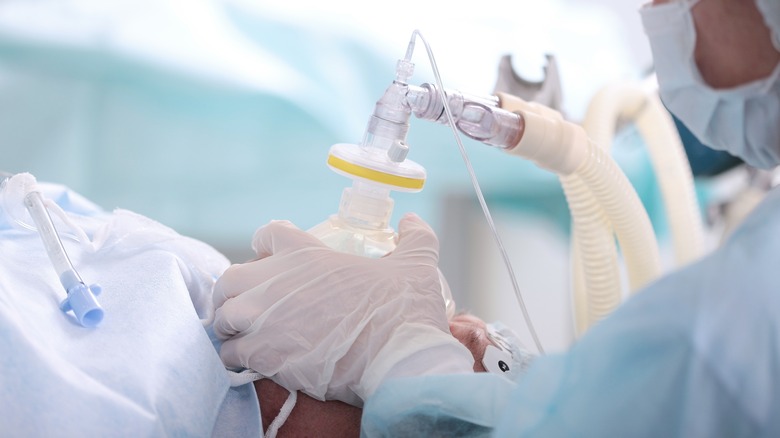Dangers Of Plastic Surgery You Never Expected
The COVID-19 pandemic has been devastating for many industries around the world. However, there's one sector that's seen an unexpected boom. Many experts have attributed the uptick in inquiries and appointments for plastic surgery to the meteoric rise in video calling — also referred to as the Zoom Boom — as successive lockdowns put a halt to our in-person activities (via Aesthetic Surgery Journal). This meant that people have spent more time than ever before scrutinizing their own faces up close, sometimes for hours on end, often from skewed angles and under unflattering lighting.
The decision to undergo plastic surgery is personal. Bodily autonomy means we each have the right to choose what's best for our bodies. As part of that choice, it's important for each individual to be aware of the possible risks and complications that can arise from plastic surgery, ranging from loss of sensation to permanent scarring and even death (via The Surgeon). Here are some of the physical, mental, and emotional costs of plastic surgery that you may not have expected.
Addiction
A large number of people who undergo cosmetic surgery struggle with body dysmorphia, details a 2018 review study from the Italian Journal of Dermatology and Venereology. What's interesting is that their symptoms often worsen after surgery as patients simply park their attention on a different part of the body instead. The skyrocketing usage of the video conferencing platform Zoom may have heightened the appetite for cosmetic alterations and enhancements, suggests a 2021 survey study (via International Journal of Women's Dermatology). This may have contributed to the rise of "Zoom dysmorphia," where people seek to rectify their distorted onscreen image.
Cosmetic surgery can improve individuals' emotional wellbeing and quality of life, according to research (via Plastic and Reconstructive Surgery – Global Open). But it can also be a slippery slope. Some patients seek to repeatedly change their appearance or body through aesthetic procedures, yet continue to feel dissatisfied with how they look, explains Mark Constantian in his book "Childhood Abuse, Body Shame, and Addictive Plastic Surgery: The Face of Trauma." Constantian sheds light on plastic surgery addiction by drawing from decades of experience as a plastic surgeon. He highlights the connection between patients' adverse childhood experiences, which often underlie posttraumatic stress disorder and shame, and the deep-seated belief that they're physically deformed.
Memory problems
The physical consequences of plastic surgery are more widely anticipated than its cognitive costs. But research shows a cosmetic procedure can also affect the way you think.
Silicone breast implants, in particular, have been found to cause brain fog and even steal your memory, according to a study published in the 2020 edition of Annals of Plastic Surgery. The findings shed light on a condition known as breast implant illness. This has been reported by thousands of women who have undergone breast augmentation surgery, but is often overlooked by many surgeons and some physicians for lacking scientific grounding. The study looked at the symptoms of 750 women who had breast implants inserted, which ranged from fatigue to muscle pain to memory loss.
A large number of women saw their symptoms improve or go away entirely within 30 days of having their implants taken out. The study authors hypothesized that the insertion of silicone triggers an inflammatory reaction in the brain, which may be responsible for breast implant illness.
A weakened immune system
Most people are aware that getting plastic surgery is no small feat. Recovery can take somewhere between a few days to a few weeks — and for some people, it can take months to fully heal, warns the American Society of Plastic Surgeons. But people often forget the massive toll that a cosmetic surgery procedure can take on immune health.
In truth, any type of major surgery can compromise the immune system, as it's a huge stress on the body (via Breastcancer.org). When the skin's surface is penetrated and cut, your immune system leaps into action to heal the incision and fight off any looming illnesses. This makes you more susceptible to infections that can affect various parts of the body, including the throat, sinuses, lungs, and urinary tract.
It's recommended that patients prep their immune system for battle prior to surgery by getting sufficient sleep, eating nutritious meals with plenty of vitamins, and keeping stress levels to a minimum.
An autoimmune disorder
Given how taxing plastic surgery can be on immune health, getting a procedure done can make you more prone to developing illnesses and diseases. At worst, this could lead to an autoimmune disorder, suggests a 2019 study published in Annals of Surgery. The researchers looked at the medical records of thousands of women who received breast implants and found that silicone implants, in particular, were associated with a number of autoimmune conditions and rare diseases such as Sjogren syndrome, scleroderma, and rheumatoid arthritis, as well as melanoma and stillbirth.
An earlier study revealed that silicone breast implants can trigger some of the symptoms of autoimmune diseases including fatigue, cognitive impairment, joint stiffness, muscle pain, fever, and dry eyes (via Current Opinion in Rheumatology). This has long been denied by some surgeons, however, since studies are yet to establish a causative relationship between plastic surgery and autoimmune disorders, as pointed out in a statement issued by the FDA (via Breastcancer.org).
Nerve damage
Sometimes, cosmetic surgery doesn't just change the way a body part looks. It can also alter the way it feels.
For instance, most patients experience changes in their sensitivity around their nipples after breast augmentation surgery, notes the University of Michigan Health website. This is usually temporary, but 15% of women report permanent changes in nipple sensation. Nerve damage is likely to occur whenever there's an incision in the skin, and some tell-tale signs include numbness, tingling, weakness, and pain (via Brain). Long-term nerve injury happens when the nerves are severely damaged.
Normal nerve function will return for the majority of people within six months to a year, and as patients recover, they're likely to experience some pain, according to research from the journal BioMed Research International. But in some cases, it can take several years for patients to fully come back to the way they were, which can be disconcerting. Where there's been permanent nerve damage, patients might struggle to make voluntary movements — this can even escalate to complete paralysis, in which case surgical nerve reconstruction may be required to restore function.
Depression
People who opt for cosmetic surgery are more likely to have a history of mental health issues (via Psychological Medicine). And contrary to what patients might expect, an aesthetic procedure doesn't always remedy these problems. Sometimes, they can even make them worse.
A study that followed young women over a 13-year period found that those who underwent a cosmetic procedure tended to be more emotionally vulnerable than non-patients, exhibiting various psychological difficulties such as anxiety and depression, greater self-harming behaviors, and suicidal ideation. The main surgical operation that patients had were breast augmentation or reduction, followed by liposuction and nose or ear alterations. Most of the women who undertook breast surgery reported struggling with body dissatisfaction, but getting a procedure didn't necessarily relieve them of their body woes. In fact, many women still felt unhappy with their appearance. In general, having plastic surgery was associated with a higher incidence of depression, anxiety, eating disorders, alcohol use, and suicide attempts, based on the research findings.
Blood clot
A blood clot is a common risk of many surgical procedures, not just cosmetic ones. The type of blood clot that crops up most frequently among cosmetic patients is venous thromboembolism (VTE), originating in the veins that transport blood to the heart (via Aesthetic Surgery Journal). VTE can include deep vein thrombosis, usually appearing in the lower leg, thigh, or pelvis, and a pulmonary embolism, which occurs when a clot breaks loose and travels through the bloodstream to the lungs, as reported by the American Heart Association.
A clot that makes its way to the lungs is a medical emergency. A large clot or several clots throughout the body can lead to death and should be treated immediately. Sometimes, VTE can go undetected since there may not be any obvious signs. However, it can still be fatal, as it may restrict or block blood flow and oxygen, compromising the body's tissues and organs (via Aesthetic Surgery Journal).
Severe bruising
Bruising is an expected side effect of plastic surgery. But a less anticipated complication is a more severe form of bruising that happens when blood collects and pools under the skin, medically termed hematoma (via MedicineNet). This is caused by a broken blood vessel, artery, vein, or capillary. It usually looks like a puffy, purplish bruise.
The potential for hematoma is present in various types of surgical procedures. It's one of the most common complications among those who get a facelift, affecting between 0.2% to 8% of patients, reports a 2021 study (via Plastic and Reconstructive Surgery – Global Open). It also frequently occurs in patients who have undergone breast augmentation surgery and lipoabdominoplasty, a surgical procedure that combines liposuction and abdominoplasty, according to research (via Western Journal of Emergency Medicine). It tends to develop in the first 24 hours after surgery, but can also surface in the subsequent months.
Other than being quite painful, a hematoma isn't necessarily a major health concern. It usually recedes and heals naturally without any treatment, but it could result in an infection or inflammation if ignored for too long (via MedicineNet).
Infection
Infection is a risk with any type of surgical intervention. Where there's cutting and opening of the skin, there's always a window for bacterial contamination. A postoperative infection remains the most frequent complication of implant-based breast reconstruction, occurring in up to 35% of breast surgeries, according to a 2020 study published in the Western Journal of Emergency Medicine. This happens when pathogens fester and multiply at the incision site. It's most likely to occur within the first month of an operation, but sometimes infections spread over the course of several months or a year (via Cogent Medicine).
Some typical signs of an infection include a red, tender, or swollen wound or pus leaking from the incision area, per Johns Hopkins Medicine. It's usually treated effectively with antibiotics, and if it's dealt with in time, it can heal and go away pretty quickly. But should an infection worsen, it can trigger sepsis, which is a potentially life-threatening condition where the body's tissues and organs quickly deteriorate, reports the National Institute of General Medical Sciences. Some noticeable symptoms of sepsis include fever, breathing difficulties, low blood pressure, disorientation, cognitive decline, and at the very worst, death.
Fluid buildup
The buildup of body fluid underneath the surface of the skin is known as seroma. This can happen when a surgeon removes tissue, cutting a vessel transporting lymph fluid and blood around the body (via Osmosis). The fluid then quickly accumulates in the dead space that's left behind, resulting in a swollen lump that looks like a large cyst. While it may not be a risk that immediately springs to mind, developing a seroma is so common that it's now considered a side effect rather than a complication of plastic surgery (via Journal of Breast Cancer). They affect around 15% to 30% of patients who have tummy tucks, according to research (via Archives of Plastic Surgery). One study detected breast seromas in 20% of patients who had gotten breast-cancer surgery (via Journal of Breast Disease).
Most of the time, seromas are harmless and doctors let them heal naturally without intervention (via Osmosis). But occasionally, a doctor might drain the seroma pocket of its fluid using a needle and syringe. An infected seroma has the potential to evolve into an abscess. A rare but dreaded consequence of a seroma is lymphedema, where the lymph ducts become blocked causing fluid retention and tissue swelling throughout the body (via The Breast). Not only can this be immensely painful, but it could also extend a patient's healing time, giving rise to further infections and complications.
A bad reaction to anesthesia
An adverse reaction related to anesthesia in plastic surgery is rare. But when it does happen, it can be life-threatening (via Indian Journal of Plastic Surgery).
Patients are usually put to sleep before surgery by inhaling a gas through a mask, as noted by the Mayo Clinic. Anesthesia medications are also administered through an IV line that's injected into a vein in the hand or arm. Most of the issues that crop up due to anesthesia are pretty minor like nausea, vomiting, or dry mouth. A more serious risk could include an allergic reaction to the chemicals in the anesthesia, resulting in the closing of airways, shortness of breath, and possibly even death, details a 2017 study (via Psychiatria Danubina). The most troubling concern about anesthesia-related allergies is that they can go overlooked, since they're difficult to diagnose.
Another potential danger stemming from the use of anesthesia is a condition called anesthesia awareness, per Mayo Clinic. This is where a patient partially wakes up, so they're conscious of their surroundings and what's happening to them but cannot move or speak. Again, this is a rare phenomenon — and it's even rarer for people to experience pain — but it can lead to long-term psychological issues in some people, such as post-traumatic stress disorder.
Bowel obstruction
Some patients are faced with a temporary illness known as postoperative ileus after undergoing surgery (via Nutrients). This is a gastrointestinal issue and malfunction of the intestines, which is sometimes called functional bowel obstruction.
Patients struggling with postoperative ileus usually have a hard time passing stool. And since food and waste isn't able to move freely through the digestive system, ileus can make it tricky to eat and recover normally (via Medicine). People who develop the condition often experience severe abdominal pain, as well as nausea and vomiting.
Some researchers attribute ileus to the use of general anesthesia, but it's been suggested that hormones or pain medications such as opioids could also be culprits (via Statpearls). There's still a lot that's unknown about ileus and the underlying issues at the root of it. The condition typically resolves itself within a few days, but sometimes symptoms can linger or worsen.
Excess bleeding
Excessive bleeding can happen while a patient is on the operating table. It can also occur in the aftermath of a medical procedure.
While some blood loss after a surgery is normal, uncontrolled bleeding can set off a cascade of issues: It may cause blood pressure to plummet, lead to a longer operative and recovery times, and could even be fatal, notes a 2019 study (via Plastic and Reconstructive Surgery). Excessive blood loss requiring a transfusion was more likely to occur from a complex plastic surgery procedure such as breast reconstruction with a free flap, with approximately 27% of patients being sent back to the operating room. Combined procedures like breast oncologic and reconstructive cases also pose a higher risk.
Bleeding-related complications sometimes arise from patients doing too much too soon and not allowing themselves adequate time to heal after surgery, warn researchers (via Journal of Cutaneous and Aesthetic Surgery). It's important not to underestimate the power of rest.













